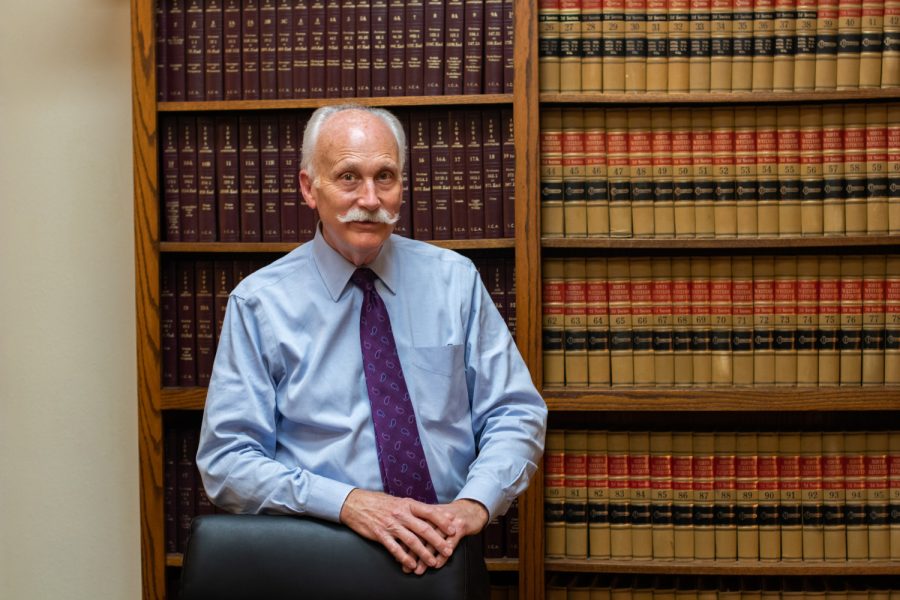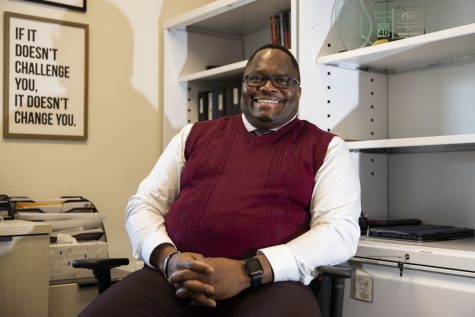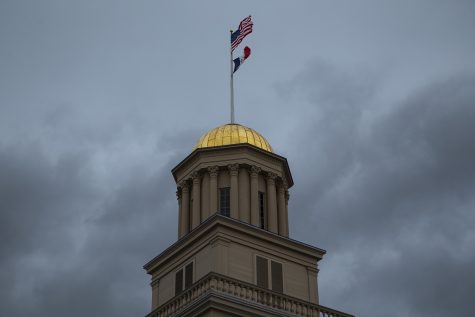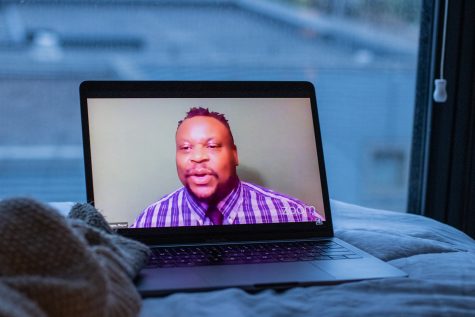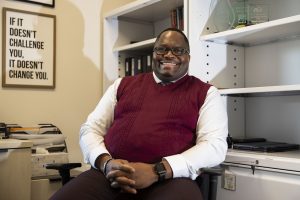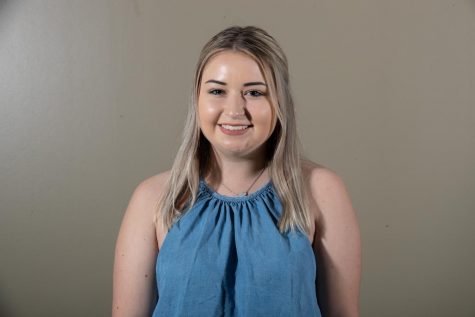‘Loving a challenge:’ Leon Spies lives life on the edge of the seat of the courtroom as Iowa City criminal defense attorney
For over 40 years, criminal defense attorney Leon Spies has taken on some of the toughest cases in Iowa City.
Leon Spies, a criminal defense attorney in Iowa City, poses for a portrait in his office. Spies attended the University of Iowa for both his undergraduate degree and for law school. His firm was originally called Mellon & Spies, but is now called Spies & Pavelich law firm. Spies will be covering the upcoming trial Roy Browning, who’s accused of murdering his wife, UI employee JoEllen Browning.
December 15, 2020
Never afraid to face any obstacle, Iowa City Attorney Leon Spies has lived a storied career on the edge of his courtroom seat as a criminal defense attorney.
“I have that reputation for loving a challenge,” Spies said.
Seventy-year-old Spies has enjoyed high-stakes courtroom drama for over 40 years and now, and continues to take on risky cases, though many of his peers have retired. He’s defended individuals charged with serious crimes, from assault all the way to a convicted meth kingpin charged with murder. Spies said the emotional toll of the courtroom has helped him develop an understanding for the motives and values of his clients to help them through it.
“I can probably count on one hand the number of clients that I haven’t felt genuine affection for,” Spies said. “They come to me at the worst times in their life and trust me with their faith.”
Now, Spies is tasked with defending a client whose alleged crime is one that captured the entire Iowa City and University of Iowa community in the spring of 2019 — Roy C. Browning.
On March 16, 2021 at 9 a.m. at the Johnson County Courthouse, Spies is set to defend Browning, an Iowa City husband accused of murdering his wife — JoEllen Browning, a UI budget official. The trial has been rescheduled on two separate occasions because of the coronavirus pandemic.
JoEllen was found dead in her home on the east side of Iowa City with multiple sharp-forced wounds, according to police records. Browning has pleaded not guilty to first-degree murder and has waived his right to a speedy trial. He is currently at the Johnson County Jail with a bail of $5 million.
“The world will know that he was a devoted husband deeply invested in the welfare of his family and JoEllen,” Spies said. “They shared a reputation as a loving generous couple.”
Spies has taken on this case at a time like no other in his career. The coronavirus has prompted requirements for mask-wearing, social distancing, and limited seating in a jury trial. Spies said the courtroom will look a little different during a pandemic than what he is used to.
On Nov. 10, the Iowa Supreme Court issued an order postponing all jury trials until Feb. 1, unless the jury was sworn in prior to Nov. 16, in which case those trials had begun in September. Jury trials had been on hold since March because of Iowa’s rising coronavirus case counts.
Although COVID-19 may have slowed down Spies’ intake of in-person jury trials, he still took on several cases during the year, including one that involved bank fraud, another on sexual exploitation by a school employee, and one on student and faculty disciplinary proceedings at the UI and other colleges. He also spent time working with professional legal organizations studying the impact of the pandemic on jury trials and the rights of criminal defendants.
Having found a forever home and career in the heart of Iowa City at the start of his undergraduate career, Spies said he has faced a few disappointments along the road. Though he does not keep statistics with wins or losses in the courtroom, Spies said he does the best he can for his clients.
“You feel their disappointment — their sadness,” Spies said. “Many of the people that come to me [have] life-changing choices facing them.”
The Blue Grass, Iowa, native has always lived a small-town life — beginning with parents that wanted the best for him, he said. Spies recalls that his father always wanted him to follow in his own footsteps as a machinist, while his mother stayed at home to take care of Spies and his sisters.
In his early school years, Spies was an active participant in debate and public speaking. “The bug that bit him” to pursue a career like his own was the speech contests he participated in, as early as his grade school days in Iowa City. Spies attended the University of Iowa in 1968. At the height of Watergate, a scandal that would lead to President Richard Nixon’s resignation in 1974, Spies came to the university in Iowa City at a time of nationwide protests and unrest on college campuses.
The UI, like many other college campuses at the time, erupted in chaos. A period of protests and havoc in the community left a young Spies to take notice of the world around him.
“It was an exhilarating time, to be socially active and interested in the world, especially in law and politics,” Spies said.
Spies began a job as a draft counselor at the UI during his undergraduate career when men were needed to go to war, advising young students about the different resources that were available to them.
Spies shared a space with the UI Student Legal Services, where he would work in a small office beside two “hippie lawyers” sporting bushy mustaches. Delighted and intrigued by such a strong fashion statement — Spies adopted a stylish handlebar mustache of his own.
“When [the other lawyers] weren’t at the office,” Spies said, “… they were at the Airliner.”
Spies graduated from the UI with his bachelor’s in 1972 and continued onto law school because of his observations and conversations with the law students around him. During his time in law school, Spies directed UI Student Legal Services and served as a supervising attorney after graduation for many years.
Spies met a young Janet Peterson who had moved to Iowa City in 1974. Peterson recalls seeing Spies during one of the early days in their relationship in his coveralls fixing up his old gold Buick. The two have been married for over 40 years, leaving Peterson there to watch Spies’ career every step of the way.
Upon graduation from law school in 1975, Spies was thrown into an extreme case load that he would have never imagined happening so quickly. Eric Heintz, a lawyer and former law-school professor of Spies, invited a young Spies to begin practicing criminal defense work. Spies said that, ever since the start of that experience, he has thrived on representing individuals accused of crime and being investigated for criminal activity. Young Spies took on court case after court case involving his passion — defending individuals in the criminal-justice system.
“Many who come to me … might be guilty of something, but not necessarily what they are accused of,” Spies said.
For Peterson, hearing the different cases Spies takes on has made her fearful of certain moments in their lives together, but she has always remained calm because of the relationship Spies creates with his clients. Peterson said the two have received threatening calls over the years in certain cases Spies had taken on.
“There have been times where I have been afraid and there have been times where he was too,” Peterson said.
A case that stands out in Spies’ career is be the conviction and eventual execution of his client Dustin Honken, considered a meth kingpin. Honken murdered five people in 1993, the first the state of Iowa had seen in death penalty cases since 1963 at the time. The state eliminated the death penalty in 1965, but federal prosecutors sought Honken’s death in 2005.
“[The cases] are all significant in a way,” Spies said. “There are no two that are alike.”
His best friend and former co-council Alfredo Parrish called Spies “just fabulous.” The two were both on Honken’s legal team in 2004.
Parrish said he has witnessed Spies in some of the toughest moments of his career, working long nights and hard on the weekends. For Parrish, his best friend has a work ethic like no other.
From long weekends in Okoboji, to spending holidays and birthdays together, Parrish and Spies have been friends since the late ‘90s and have remained that way throughout their careers.
“He’s just one of the few guys I share just about everything in my life with,” Parrish said.
CJ Williams, a friend and Cedar Rapids federal courts judge, said Spies represents all that is good and noble about the practice. Spies and Williams were prosecutors together prior to Williams’ career change and have seen one another in professional and high stakes arenas.
“[Spies] is mesmerizing in front of a jury,” Williams said. “The touchstone is justice and how he has always had compassion for his clients.”
Spies’ career has allowed him to move all over the country to work with clients. He said he has often “toyed the notion” of leaving Iowa, but could never get himself to do it. Spies has raised two daughters with his wife, who is involved in social services. Iowa City, the city he “fell in love with,” will be a forever home to Spies and his practice.
Spies currently operates at his office on East College Street in Iowa City with his partner, Joseph Pavelich, a graduate from the UI. Pavelich began practicing at Spies’s old firm in 2005 upon his graduation. Pavelich said he arrived at the interview about 20 minutes late that day, but Spies was nothing but gracious and kind.
“Our practices are in different areas of law, but in terms of how to be a professional, he has taught me so much more,” Pavelich said.
Despite what the city’s toughest accused clients may bring, Spies said that one of the things he values the most and what sets him apart from other attorneys is his motivation to know his clients — and know them well.
“You really begin to delve into their story as human beings,” Spies said. “And in doing that, you invest a lot of emotional energy in the case. You share their disappointments, you understand their family presses — their personal presses. And I think that it makes me both a more effective lawyer and advocate for them, at times when it’s important for me to do so.”



